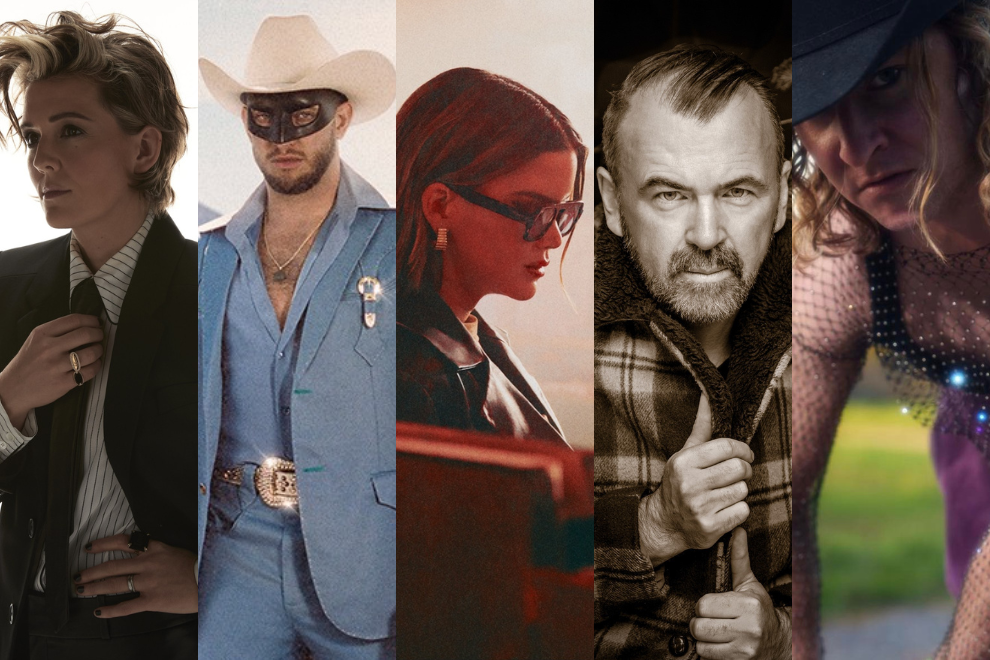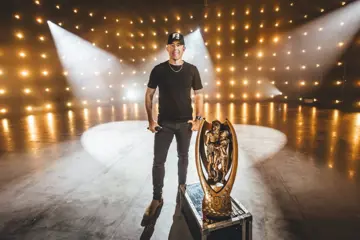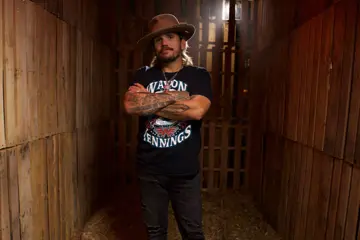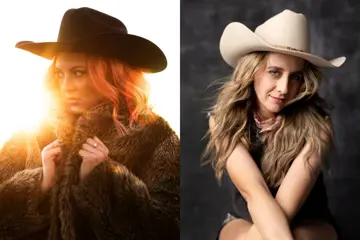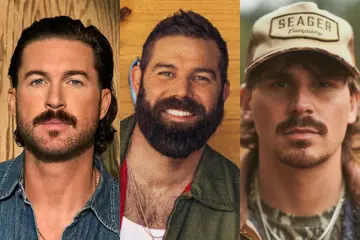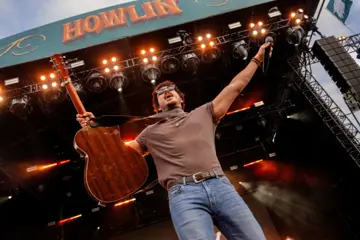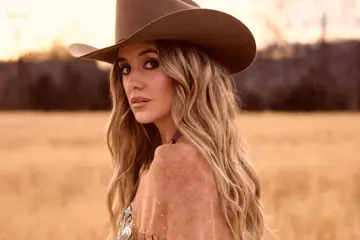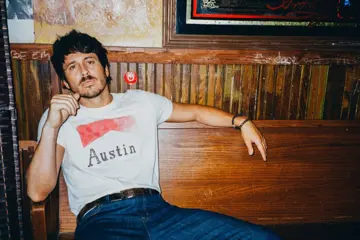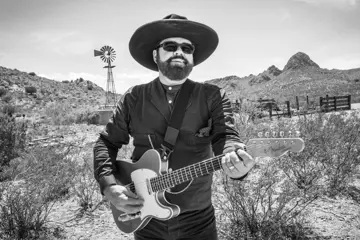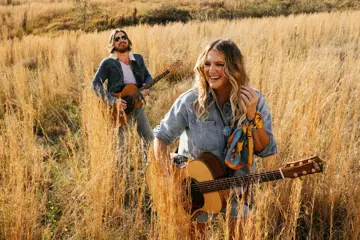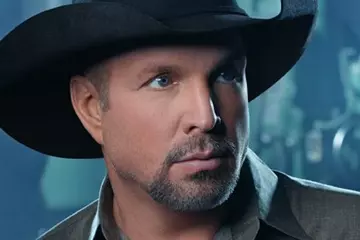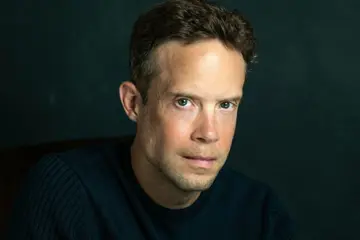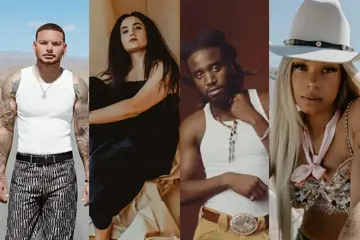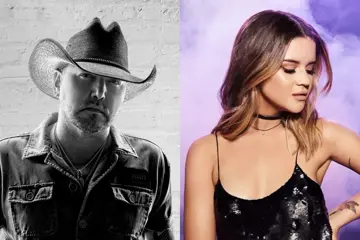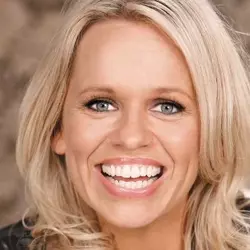 Beccy Cole
Beccy ColeIn case you didn’t know already, June is officially recognised around the world as Pride Month – a time when the LGBTQ+ community comes together to celebrate and embrace the diversity in our identities. It’s also the perfect time to think about and discuss how far our society has come on issues of equality and acceptance in regards to gender and sexuality.
Although huge strides have been made over recent years – including the passing of the same-sex marriage bill in Australia in late 2017 – there are still long ways to go in country music.
Many individuals who identify as queer choose to remain closeted out of fear; experiences of “coming out” can be traumatic, especially in a scene that is not particularly known for accepting diversity. Countrytown is proud to shine a light on those that are out and proud in the country music community – we applaud and thank those that are standing up and creating visibility so that the next generation of queer musicians know they’re not alone, and see our genre and industry as not only accepting, but welcoming and encouraging.
It's time to celebrate those in our country music community that are out, proud and leading the way.
1. Beccy Cole
On the cusp of her 40th birthday, 11-time Golden Guitar winner Beccy Cole came out to the public on Australian Story in 2012. Cole, who is now married to cabaret singer Libby O’Donovan, decided to come out to set a positive example to her then-13-year-old son, Ricky. After a brief marriage to fellow musician Mick Albeck, Cole said she made her "personal discovery" when her son was less than a year old.
2. Billy Gilman
Billy Gilman, who found success in country music as a child in the early 2000s, came out as gay in 2014. After years of speculation, he made the announcement with a YouTube video when he was 26, after being spotted with his partner by a local reporter. He said, “It’s difficult for me to make this video, not because I’m ashamed of being a gay male artist, or a gay artist, or a gay person. But it’s pretty silly to know that I’m ashamed of doing this knowing that because I’m in a genre, and in an industry, that is ashamed of me for being me.”
3. Brandi Carlile
Join our community with our FREE weekly newsletter
Six-time Grammy Award winner, Brandi Carlile came out as a gay woman back in 2002 and married her partner, Catherine Shepherd, in 2012. Now the couple has two children, Evangeline and Elijah. In her memoir Broken Horses, Carlile talks about the youth pastor who refused to baptise her because she was gay, her relationships with girls in secret at school, her confusion and struggles about what her role was when her wife was pregnant through IVF, the lack of LGBTQ+ representation in media and culture and more.
4. Brandy Clark
Brandy Clark, who hadn’t realised she was gay until she was in her early 20s, has been carrying the torch for LGBTQIA+ people in country music since launching a recording career in 2013. She also co-wrote Kacey Musgraves’ progressive ditty Follow Your Arrow, which casually brought LGBTQIA+ inclusivity to Southern consciousness. She said, “I don’t think any of us realised that day or even when she put it on the album what a moment it was for a lot of people. I’m really proud … that the LGBTQIA+ community feels represented.”
5. Brooke Eden
Brooke Eden’s 2021 single Got No Choice is her story with her partner of five years, Hilary Hoover. The two met through their work in the music industry, and their sweet love story is at the centre of a trilogy of songs Eden released a few years back, also including No Shade and Sunroof. Directed by Ford Fairchild, the accompanying music video captures the pair’s love on film in an organic way.
6. Brothers Osbourne
T.J. Osborne, one-half of the platinum-selling country hit-makers Brothers Osborne, revealed he is gay in an interview with Time earlier this year. The 36-year-old said he’s known he was gay since he was young and has been out to friends and family for years. He describes being closeted as “painful, lonely and isolating” and hopes that coming out might open the door to more gay country music fans.
7. Hayden Joseph
Nashville-based rising pop-country star, Hayden Joseph recently released his uplifting anthem of self-acceptance, Out. As an openly gay male pursuing a country music career, he prides himself in the inclusive nature of his lyrics and strives to continue breaking industry barriers. Joseph has been making waves as one of the few out-and-proud singers in the country genre for the better part of the last year, following the successful release of his 2021 debut album Different, which has garnered over 300,000 streams.
8. Katie Pruitt
Katie Pruitt is a 27-year-old Americana artist who recently released a defiant album about being a lesbian raised Catholic in Atlanta. Songs like Loving Her, Normal, and Georgia speak of her ongoing struggle to embrace her own queerness and encourage those around her to do the same. She’s described It’s Always Been You as a love song to her current girlfriend, with whom she’s experienced a healthy, loving relationship for the first time in her life.
9. Logan Hoswell
Logan Hoswell played an important part in country music history when she joined married couple Beccy Cole and Libby O’Donovan onboard the first LGBTQIA+ pride float at the Tamworth Country Music Festival cavalcade in 2020. Hoswell also credits the couple as an inspiration to help her come out to friends and family at 18-years-old. She told ABC News, "My family as well have been so great about it; they just acted as if nothing ever changed, which is the way it should be."
10. Orville Peck
Billboard described Orville Peck as “the masked gay crooner revitalizing classic country’s spirit”, which sums up why he was the perfect choice to cover Lady Gaga’s Born This Way for the anniversary edition of the album of the same name, which features six tracks from different artists who are representing and advocating for the LGBTQIA+ community. In addition to the countrified remix, Peck updated the bridge’s lyrics to be more inclusive for 2021, swapping the words “chola” and “orient” for “Asian” and “Latinx”.
11. Amythyst Kiah
Tennessee native Amythyst Kiah quippily describes herself as a “funny-talking, sci-fi-loving, queer Black”, and as an artist, she really wears her heart on her sleeve. In a 2021 interview with Billboard, she explained that “in order to truly be happy and fulfil my purpose in life, I had to embrace who I honestly am, in every way”. Nowhere clearer is that shown than on her stellar third album, Wary + Strange, which she declared “serves as a way to cope with the crippling anxiety I’ve felt about my identity, who I was and where I fit in”. Prior to its release, Kiah earned a Grammy nomination for Best American Roots Song at the hand of her soul-baring anthem Black Myself.
12. Lavender Country
Lavender Country were genuine trailblazers for the queer community, not only in country but the music industry as a whole – and indeed the public eye altogether. Their eponymous debut album, which arrived more than 50 years ago in 1973, is widely regarded as the first ever country album with overtly queer themes. It was minted with the backing of the Gay Community Social Services Of Seattle, with activist Faygele Ben-Miriam playing a pivotal role in its funding and production. Lavender Country went on to perform at the first Seattle Pride in 1974 – the first of many such events they’d appear at.
Of course, cutting their teeth when and where they did, Lavender Country found themselves at the centre of countless controversies. Shortly after their self-titled album was released, for example, a DJ at Seattle’s KRAB radio station was fired for broadcasting the single Cryin’ These Cocksucking Tears. The band didn’t let those incidents stop them from thriving, though, and they remained active (albeit with some lengthy hiatuses) until 2022.
13. Lily Rose
Within a year of her debut, Lily Rose was making gargantuan waves as one of the brightest new voices in country; her 2020 single Villain became an overnight hit, thanks in no short part to its captivating beat and poignant lyrics – and before long, the openly lesbian artist found herself square in the middle of the country scene’s spotlight.
In an interview with Rolling Stone the following year, Rose opened up about how it felt to lead a new generation of country artists proud to own their queerness: “I’m just such a fan of country music that it makes me so happy. Not only here in town are there artists and songwriters who can feel like they can be themselves, but to the world, they feel like we’re at a time where it’s like, I can fully be myself. It’s a really special thing to be part of this community. We’re all just going to keep knocking down doors to eventually change hearts.”
2022 saw Rose make two big milestones: not only did she join CMT’s Next Women Of Country cohort, she also became the first country star to be crowned a Breakthrough Music Artist at the GLAAD Media Awards.
14. Maren Morris
Maren Morris’ domination of the modern country-pop scene has been amazing to watch from the sidelines; not only have her three studio albums (2016’s Hero, 2019’s Girl and 2022’s Humble Quest) earned her a suite of incredible accolades – like five ACM Awards, five CMA Awards, eight BMI Awards and one Grammy – but she’s also shone on the small screen with two appearances each on CMT Crossroads and RuPaul’s Drag Race, a stint guest hosting Jimmy Kimmel Live!, and even a cameo on Sesame Street.
Morris came out as bisexual earlier this month, saying in an online post celebrating Pride Month that she’s “happy to be the B in LGBTQ+”. Long before then, however, she’s been an outspoken ally for the queer community, even receiving GLAAD’s Excellence In Media Award last year. In her acceptance speech, she declared that “making the right decision shouldn't take bravery or courage. It shouldn't take heroic effort to want basic human rights for everybody.”
15. Michael Waugh
Breaking out in the mid-2010s, Michael Waugh became a fast favourite in Australia’s burgeoning country music world. He came out as gay after the 2022 Golden Guitar Awards, baring his soul in a message of thanks after taking out the gong for Heritage Song Of The Year (at the hand of his brilliant single Dirty River). He wrote at the time, “It might have been easier for me to do this earlier had I seen more people like me doing something like this... They say you can’t be what you can’t see. So, I hope that someone sees our amazing suits... and know[s] that it’s safe to be authentically yourself walking down a red carpet…”
Speaking to Countrytown shortly thereafter, Waugh opened up about the struggles he faced growing up as a closeted queer person – a time fraught with deeply rooted feelings of shame and humiliation, with which music serves as a tool to reckon: “There's a litmus test that I have when I'm writing that if I'm afraid to say it, then that's probably a good reason why I should,” he said.
16. Mya Byrne
Mya Byrne’s soulful Americana has soundtracked New York’s dedicated underground country scene for more than two decades. She cut her teeth playing in The Ramblers, but after coming out as a trans woman in 2014, she levelled up her artistry with the launch of her incredible solo project (releasing her album As I Am that same year). The following year would see her named an Emerging Artist at the Falcon Ridge Folk Festival, and the first-place Americana winner in the Great American Song Contest.
Byrne has long been outspoken about her identity and how it fuels her art – as a writer, she’s had essays published by the likes of The Advocate, Huffington Post and The James Franco Review, and since 2020, she’s worked as a staff writer for the magazine Country Queer. As a musician, too, she’s performed at events like Berkeley Pride and the San Francisco Trans March, and her work was featured in the critically acclaimed play [Trans]formation. She signed to Kill Rock Stars in 2022, and after nearly a decade of mounting hype, released her second solo album, Rhinestone Tomboy, last April.
17. Paisley Fields
Over the past ten years, Paisley Fields has built up a remarkable following as a defiantly loud and proud queer, non-binary country artist. Their songwriting is bold and raw, championing their identity while paving the way for others to do the same for themselves, and candidly sharing the experiences – good and bad – that shaped them into who they are today. This is best heard on their third album, 2022’s Limp Wrist, which is shaped around earnest and enrapturing meditations on life as a queer person in rural America. The topics they explore range from the traumatic experience of being outed (Blackhawk County Line) and the push to fight anti-trans legislation (Burn This Statehouse Down, a duet with Mya Byrne) to revelling in gay sex (Ride Me Cowboy).
18. Ryan Cassata
It’s because of people like Ryan Cassata – who came out as trans in 2009, live on The Larry King Show, when he was just 15 years old – that so many trans and queer kids today feel able to embrace their own identities. Cassata is a devout activist for his communities, frequently speaking at high schools, universities, support groups and conferences (in 2012, for example, he became the youngest elected keynote speaker at the Philadelphia Trans-Health Conference).
Cassata’s emotively charged music candidly explores his story as a young trans man, and it’s earned him plenty of well-deserved fame – like in 2019, when he won the ASCAP Foundation’s Sunlight Of The Spirit award, or six years earlier (in 2013) when he was honoured as the first openly trans artist to play the Vans Warped Tour. His appearance in the 2020 film No Ordinary Man also helped it earn a nomination for Outstanding Documentary at the 2022 GLAAD Media Awards.
19. Sarah Shook
Another radiant non-binary artist making waves en masse is the North Carolina-native Sarah Shook, whose twangy, punk-infused country music earned them a devout fanbase at the turn of the 2010s. They’re best known for the four brilliant albums they released with their band The Disarmers – especially 2018’s Years, which earned critical acclaim from scene-leading publications like Rolling Stone and PopMatters, and was centred in the festival-darling documentary What It Takes. In 2022, Shook debuted their indie-rock project Mightmare, with the equally beloved Cruel Liars album dropping that same year.
Outside the studio, Shook is passionate about fighting for LGBTQ+ liberation and civil rights causes. In 2016, they and fellow artist/activist Erika Libero won the Indy Arts Award for their work with the Safe Space initiative, encouraging local businesses to make it visible for people in marginalised communities to know they’re welcome and supported. They also steered the ship in launching Manifest, a two-day music festival that only platformed bands featuring at least one female or non-binary member.
20. Ty Herndon
Ty Herndon rose to fame as a country star in the early 1990s, with three #1 hits on the Billboard Hot Country Songs chart by the end of the decade (What Mattered Most in 1995, Living In A Moment in 1996 and It Must Be Love in 1998). With such a storied legacy behind him, Herndon is widely considered to be the first mainstream male country star to come out as gay; he shared his identity in a 2014 interview with People, explaining that he’d been in a loving relationship with another man for years at that point.
Herndon’s 2016 album House On Fire largely explored his experiences as a queer man in country music, including the prejudice he’d faced after coming out. He credited inspiration to fellow country star Chely Wright, who came out as lesbian in 2010, for helping him build up the courage to embark on a similar journey for himself; since then, too, the pair have joined forces for multiple GLAAD benefit concerts. Also in 2016, Herndon and CMT presenter Cody Alan launched the annual Concert For Love And Acceptance, raising funds and awareness to benefit queer youths in Nashville.
EDITOR’S NOTE: Entries 1-10 were written by Mallory Arbour (and originally published on Countrytown in 2021), with entries 11-20 written by Ellie Robinson for this 2024 update.
